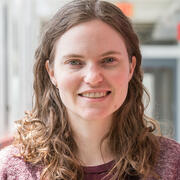
With the celebration of Harvard’s first-ever virtual Commencement now complete, the Bok Center bids a fond farewell to another cohort of alumni, including dozens of undergraduate and graduate student fellows. Though they may have received their degrees in topics ranging from Hebrew Philology to Human Evolutionary Biology, their shared commitment to cultivating a community of thoughtful and reflective teachers and communicators here at Harvard will serve all of them well in their future careers. We are proud of their many accomplishments, and look forward to hearing great things from them in the years to come.
One of our newest alumni is Erin Hutchinson, PhD ‘20, who earned a Bok Teaching Certificate and served as a Pedagogy Fellow in the History Department en route to completing her dissertation on “The Cultural Politics of the Nation in the Soviet Union after Stalin, 1952–1991.” As a Pedagogy Fellow, Erin taught the History Department’s longstanding pedagogy and professional development course (HIST 3920), observed and debriefed more than twenty of her peers as they taught their sections and tutorials, and started a journal club focused on the teaching of history. She later became a Prize Instructor in the department, offering her own undergraduate seminar while still a graduate student, and took Bok Seminars on Teaching with Images and Objects, Critical Pedagogies, Teaching and the Job Market, and Mentoring to fulfill the requirements for our teaching certificate. Next year she will remain at Harvard as a postdoctoral scholar at the Davis Center for Russian and Eurasian Studies, and in 2021–2022 she will take up an assistant professorship in the History Department at the University of Colorado at Boulder.
We talked with Erin shortly before commencement to discuss the many different ways she participated in the Bok Center’s programming, and what she hopes to carry forward with her into her career as a faculty member at Colorado.
When you first came to graduate school, how did you think teaching would fit into your time at Harvard?
I come from a family of K–12 teachers. My mom is a history teacher—she's currently retired, and now a member of the school board, which is really cool—and my sister currently teaches in Chicago public schools. So we were all kind of always thinking about these issues around the dinner table; it was part of my family’s day-to-day lives. And I remember when I wrote my application for graduate school, I put something in my personal essay to the effect of “I'm really excited about teaching.” People said, “You should just take that out; nobody who's accepting you to graduate school really cares that you're excited about that.” Which says a lot, I think, about how people perceive how teaching is valued in our profession. But I was definitely excited about it.
How did you come to be involved with the Bok Center?
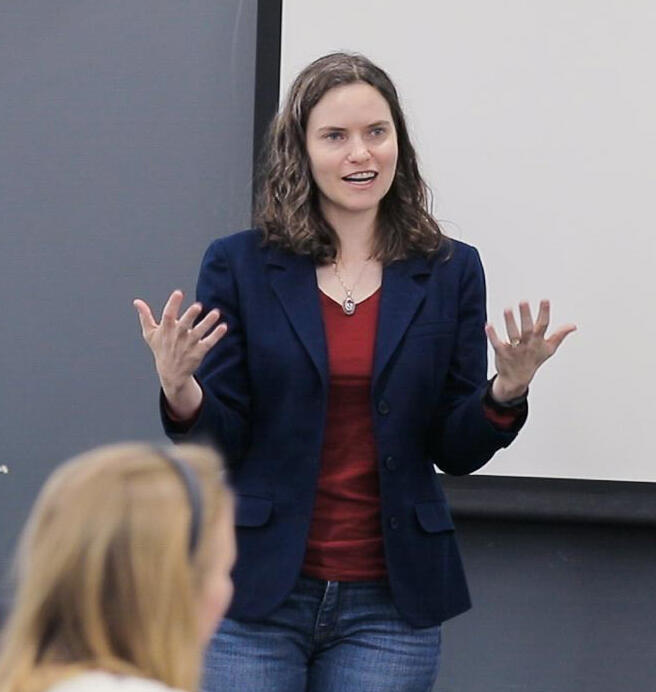 My interaction with Bok started with taking [the History Department’s teaching colloquium, HIST] 3920, and with the Fall Teaching Conference at the beginning of the semester. I think it was pretty successful, overall, [HIST] 3920. And it was just really interesting to get to talk with folks every week about teaching. So that got me interested in it, and then I was much more aware of what the Bok Center had to offer. So then once I came back from my research year and had a little more time, I decided to get more involved. I missed having the chance to talk about teaching somewhere and wanted to keep thinking about it; and so that that was my motivation.
My interaction with Bok started with taking [the History Department’s teaching colloquium, HIST] 3920, and with the Fall Teaching Conference at the beginning of the semester. I think it was pretty successful, overall, [HIST] 3920. And it was just really interesting to get to talk with folks every week about teaching. So that got me interested in it, and then I was much more aware of what the Bok Center had to offer. So then once I came back from my research year and had a little more time, I decided to get more involved. I missed having the chance to talk about teaching somewhere and wanted to keep thinking about it; and so that that was my motivation.
Why is teaching a place where people so often look for community?
I always had the model of this growing up because a lot of [my mother’s] closest friends were her “teaching buddies,” as my dad calls them. I think that in teaching you're really learning on the job. It's a new group of students, and you just throw stuff against the wall, and you're always diving into the unknown. It really makes it helpful to talk to other people who are going through that same experience. I feel like it's one of the great things about the Bok Center that it provides a forum for people who are interested to have that experience. I know I talked to our D[irector of] G[raduate] S[tudies] when I was the Pedagogy Fellow—Dimiter Angelov. He said that they didn't have any sort of [HIST] 3920 equivalent when he was a Harvard graduate student. And so he was almost depressed because he thought that he must be bad at teaching, because it was hard! I think there's just something about teaching where it becomes a lot better and … a lot more interesting if you have a community of people to talk about it with. And so I think that the Bok Center definitely has provided that for me.
I think another cool thing about teaching is that it helps you forge community with people outside of your specific field.… We have a really strong cohort of Russian and East European historians [at Harvard], but through the Bok Center I met people from different departments. And even within my own department—some of the people I talk about teaching with the most in my department are Americanists [even though] it's very easy, given that our Russian and East European cohort is so strong, for people to go their whole time here and really not talk to anyone but other Russian or Central Europeanists. But I have a lot of friends that I talk about teaching with who are Americanists. I think that's been a cool part of my graduate student experience.
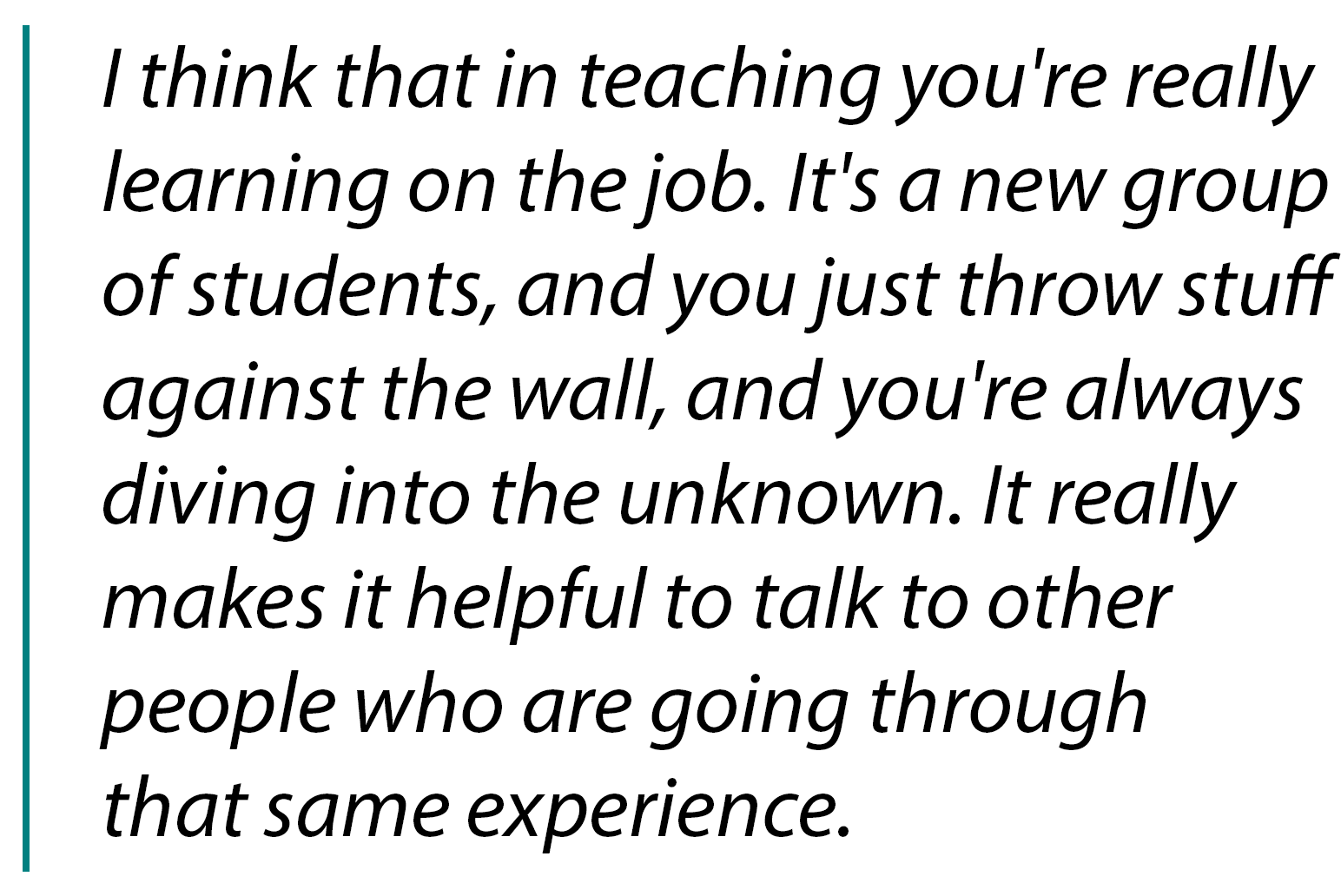
How do you think about the relationship between your teaching and your research?
I think one of the blessings in disguise about my trajectory as a Teaching Fellow is that—it was really difficult at first—all three of the [faculty] in my regional area in history went on leave the year that I started teaching. So I was really teaching outside of my field. But then the material that I was teaching, when I was writing grant applications and things like that—a lot of those concepts I was learning came up! So I think one of the cool things about teaching is that it does take you out of your specific research focus, and you have to speak to broader topics, and then it helps you to put your narrow research into a bigger context. It's funny, but for my dissertation I definitely thought about some of the big ideas from the courses that I taught as a third year graduate student, when I was teaching out of my field. And then having the chance to teach something that was in my wheelhouse as a History Prize Instructor was also great, because I got to have a room full of very bright and eager Harvard undergraduates talk about Soviet literature with me—which is what my dissertation is on—and I felt like it really helped me think through a lot of the ideas. So I think that was also very interesting and productive. But I think teaching outside of my field also helped me with my research in an interesting way.
How do you know when you’re doing a good job as a teacher?
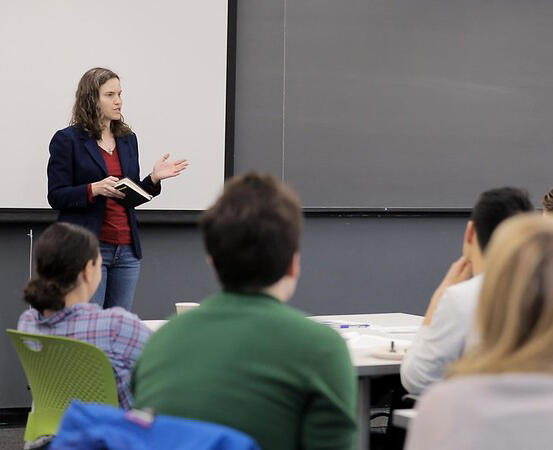 That's an interesting question. … I think that obviously it's great when you get some sort of validation through numbers and evaluations, but I think that you have a better idea if you're doing a good job from your interactions with students. I always feel like I really did my job if a student came to office hours and left understanding something better than when they came in. One of the nice things about teaching my seminar was that I got to see their results in their final 20-page research papers. To see students go from really not knowing much about my subject area to be able to write something that has something new to contribute to the study of the Soviet Union in some small way—that was something that helped me feel like that had been a successful course, more so than the evaluations—just getting to read their papers and thinking, “Oh, they got it. Yes.”
That's an interesting question. … I think that obviously it's great when you get some sort of validation through numbers and evaluations, but I think that you have a better idea if you're doing a good job from your interactions with students. I always feel like I really did my job if a student came to office hours and left understanding something better than when they came in. One of the nice things about teaching my seminar was that I got to see their results in their final 20-page research papers. To see students go from really not knowing much about my subject area to be able to write something that has something new to contribute to the study of the Soviet Union in some small way—that was something that helped me feel like that had been a successful course, more so than the evaluations—just getting to read their papers and thinking, “Oh, they got it. Yes.”
So this seems like an approach focused on empowering students to do their own research, and to see scholarship as an ongoing, intergenerational conversation…
I know one of the well known historians in my field, Ronald Suny—one time I noticed in one of his footnotes that he thanked an undergraduate that he'd had, who happened to be one of my classmates in graduate school, for having helped him think through some of the ideas. And I definitely feel, after having taught that course, I have undergrads I could thank in footnotes, to say that this paper helped me think through this particular concept or that particular concept.
Tell us about what the future holds for you.
[In 2021–2022, after a postdoctoral year at the Davis Center,] I'll be starting a position as an assistant professor of history at the University of Colorado at Boulder with my absolute dream job title, which is the study of Russia and its borderlands—exactly what I do. So I'm going to be teaching at a large research institution, one that's fairly STEM focused, which I think will be interesting. [It’s] kind of like Arizona State, where I was an undergraduate. CU Boulder is different from Arizona State, but in some ways it’s similar; it's a broad group of students, a state institution, larger class sizes. … . So I'm looking forward to tackling that and starting to design my own courses.
They have something called the History Teaching and Learning Project (HTLP). That was one of the [reasons] I was so excited to have an on-campus interview for that job, because everyone I talked to was very interested in teaching, and it gave me something that I could talk about with every person. I never realized that that would be something that would really help in an on-campus interview, but it gave me something to ask everyone about, something to talk to everyone about, and I could have a good conversation with someone whose work I was otherwise totally unfamiliar with. Because I could say “we both read this pedagogy thing; what do you think about this?”
I felt like I had an exposure to different schools of thought on pedagogy, which helped me manage some of the dynamics there as well. There are so many different camps of pedagogy; and it seemed like there were some folks who are into the Sam Wineburg, sort of scientific, methods to figure out the best way to teach, actually doing studies. And then there's the more critical pedagogy sort of thing. And so I could tell [that in] the department there are people who are a little more Wineburg school people, [and some] more on the critical pedagogy side of things. And so I felt like I could talk to both groups because I had participated in the [Bok Center’s critical pedagogy seminar]. I could talk to different groups because I had been exposed to different schools of thought at the Bok Center.
What kind of pedagogy do you want to model to the people who will be looking to you, a professor, for guidance?
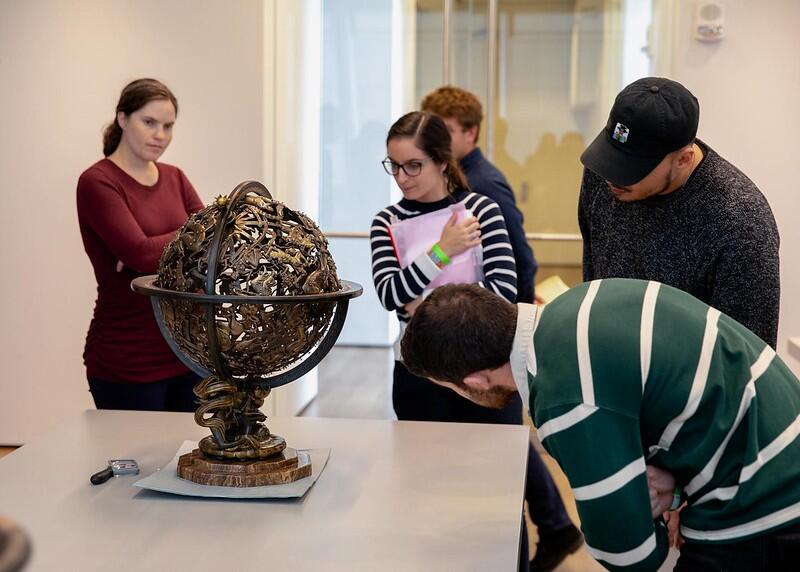 That's a really interesting question. I feel like this is something that we thought about in the mentoring seminar that Bok offered this last semester. A big theme of all of the Bok Center programming, I think, is taking a step back and reflecting.
That's a really interesting question. I feel like this is something that we thought about in the mentoring seminar that Bok offered this last semester. A big theme of all of the Bok Center programming, I think, is taking a step back and reflecting.
I think it's very interesting to have to think about what I want students to take away from my classes. I want them to have a sense that they can discover something new and they can have something to say. … I want students to understand and to feel empowered that they can learn something that's cool and new about the world, and that can come from a lot of different experiences. If you're going to make a big important contribution to history it doesn't necessarily have to come from sitting around a seminar table and talking about great books. You can follow your own curiosity. You can find things that you find curious and want to pursue. I would like students to feel empowered, and some sort of sense of agency—that they can chart their own intellectual trajectory based on what they're interested in, and have something to say.
I often say that one of the reasons I'm so interested in nationalities issues in the Soviet Union and issues of diversity and language is that I grew up in the American Southwest, where it's very diverse—lots of Spanish speakers—and so it shouldn't be surprising that I ended up being really interested in these issues, though now I work on them in a different context. So your own intellectual curiosity can be a way of life, processing things that you encounter in your everyday life. And you don't necessarily have to study the place from which you come; you can study these issues other places as a way of learning about yourself and your own experiences.

Any last thoughts?
I think it's really important to have a community of people to talk about teaching with, which I think the Bok Center helps facilitate in a lot of different ways. I really like how the seminars take a step back and encourage you to think about what you want to teach—when you're designing a syllabus, not just the content, but what sort of skills do you want to teach? Or when thinking about mentorship, doing so in a conscious way [about] what you want your mentees to learn. That's another thing I really liked about the Bok Center. And I definitely also want to mention [Assistant Director, Graduate Programming] Rebecca [Brown]’s seminar [about] teaching through images and objects, because people always talk about using different types of sources in teaching, but that was one where we tried many different exercises about how to teach someone to read an image. That's something that people talk about; but then we actually had a place where we were thinking about all the different ways that you can help students process an image, down to “draw this” or how do you design questions so that they see things differently. I thought that was another really cool thing—we all want our students to go away having learned all these awesome things, but in the Bok Center we would figure out practically how to do that. And so I really liked that as an element of the seminars.
The other cool thing I really liked was the teaching observations, which I remember definitely helped me. I learned so much from watching everyone else teach, which was really cool. And then having [Director of Pedagogy] Adam [Beaver] do an observation of my class—that's something that I think we don't do enough of, is watch each other teach. We can be kind of defensive or nervous about it, but I think that that's another thing that I wish that we would normalize more. I really liked that that was a component of the teaching certificate program. And also our class that I took, and then taught [i.e. History 3920]—I really enjoyed the actual process of getting to watch all these other students teach and being observed myself. So I think it's cool and unique.
Thinking about the Pedagogy Fellow program—I wish everyone who goes to graduate school could have that kind of help. This experience we had as PFs, having the exposure to different types of scholarship, and to have people to talk with—that was a really fun part of the “other” grad school experience. I credit it with making me very impatient with bad teaching now. I'm always expecting everything to be interactive; I became very spoiled. I always like that you guys walked the walk, when you're teaching a class. It always felt very interactive and it's great because you practice what you preach.
